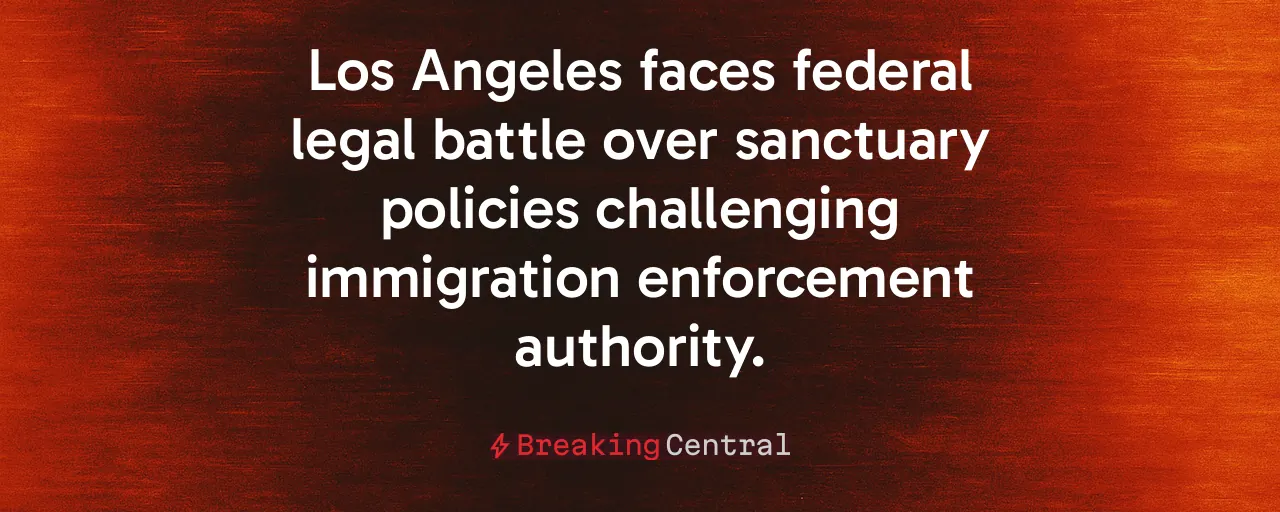A City's Defiance Sparks Federal Clash
Los Angeles Mayor Karen Bass doubled down on the city's sanctuary ordinance in late June 2025, vowing to resist a federal lawsuit filed by the Trump Administration. The suit, targeting Bass, the City Council, and the city itself, claims the policy obstructs immigration enforcement and fuels unrest. This clash extends beyond local news, becoming a high-stakes battle over control of America's immigration system and whether cities can choose which federal laws to follow.
The ordinance, formalized in December 2024, restricts city resources from aiding Immigration and Customs Enforcement (ICE) and limits sharing detainee information except for serious crimes. Bass calls it a stand for families and trust. Critics view it as a deliberate challenge to federal authority, setting a dangerous precedent for other cities to follow.
The conflict has a history. Tensions flared in June 2025 when protests erupted over nationwide immigration raids and federal troops deployed to Los Angeles. The Justice Department points to assaults on federal officers during these clashes as evidence of the ordinance's fallout. The question now is whether Los Angeles can defy the law without unraveling the nation's immigration framework.
The Cost of Non-Cooperation
At the heart of the lawsuit is a simple principle: federal law trumps local policy. The Constitution's Supremacy Clause makes that clear, yet Los Angeles insists on shielding undocumented immigrants from deportation. The Justice Department argues this creates a haven for illegal activity, citing ICE data showing local jails releasing non-citizens who later committed new crimes. One case involved a detainee, freed despite an ICE detainer, who was rearrested for assault within months.
The Heritage Foundation has long warned that such policies enable criminal organizations to exploit gaps in enforcement. By refusing to honor ICE detainers, cities like Los Angeles risk letting dangerous individuals slip through the cracks. The issue centers on ensuring those who break serious laws face consequences, regardless of status.
Public safety is not the only casualty. The city's stance erodes trust in the rule of law. When local officials treat federal agents as adversaries, it sends a message that some laws are optional. This creates a challenging situation. If Los Angeles can ignore immigration enforcement, what's stopping other cities from defying federal tax or gun laws?
A History of Defiance
Sanctuary policies have a long history. They trace back to the 1980s, when churches sheltered Central American refugees. San Francisco's 1989 "City of Refuge" ordinance set a modern template, and Los Angeles has leaned into similar practices for decades. The current showdown, however, echoes the first Trump term, when executive orders targeting sanctuary cities sparked lawsuits. Cities like Chicago and Philadelphia won in court, citing the Tenth Amendment's limits on federal overreach.
Those victories emboldened local leaders; however, the landscape has shifted. The 2025 Los Angeles lawsuit hinges on new evidence of unrest and non-compliance. Unlike earlier cases, the Justice Department now points to specific incidents, like the June protests, to argue that sanctuary policies destabilize communities. The courts may not be as sympathetic this time around.
Restoring Order Through Accountability
The solution lies in enforcing federal authority without trampling local autonomy. First, courts should strike down ordinances that openly defy the Supremacy Clause. Los Angeles cannot be allowed to selectively apply federal laws while expecting federal funds. Conditioning grants on cooperation, as proposed in past executive orders, is a practical step. Cities reliant on policing or housing grants would think twice before stonewalling ICE.
Mandating information-sharing is another solution. Federal law already requires jails to report citizenship status; however, Los Angeles skirts this by limiting data on detainees. A clear mandate, backed by penalties, would close that loophole. Prioritizing the removal of non-citizens arrested for crimes, even without convictions, would also deter repeat offenders.
These steps focus on fairness. Law-abiding residents, including immigrants, deserve communities where local and federal agencies work together to keep dangerous individuals off the streets. Los Angeles' defiance undermines that shared goal.
Looking Ahead With Clarity
The Los Angeles lawsuit is a test of America's commitment to unified governance. If cities can opt out of federal immigration law, the system crumbles. The evidence is clear: non-cooperation creates risks, from unchecked crime to eroded public trust. Restoring accountability through litigation, funding conditions, and mandatory data-sharing offers a path to balance.
The effort is not about vilifying immigrants. It centers on ensuring laws apply equally, regardless of an individual's background. Los Angeles residents, like all Americans, deserve leaders who prioritize safety and order over political posturing. The courts now have an opportunity to address these issues.
As the legal battle unfolds, one thing is certain: the nation is watching. The outcome will shape Los Angeles' future and the broader fight over who defines America's borders and how they are enforced. The stakes couldn't be higher.
